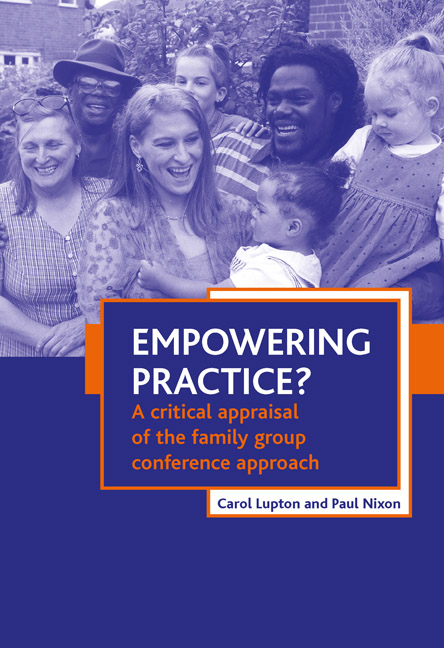Book contents
- Frontmatter
- Contents
- Preface
- Acknowledgements
- Introduction
- one The dilemmas of empowerment
- two Partnership and empowerment in children’s services
- three Lessons from New Zealand
- four Empowering professionals?
- five International perspectives
- six Empowerment in process?
- seven Assessing outcomes in child welfare
- eight Empowering outcomes?
- nine Conclusion
- Bibliography
- Index
four - Empowering professionals?
Published online by Cambridge University Press: 05 July 2022
- Frontmatter
- Contents
- Preface
- Acknowledgements
- Introduction
- one The dilemmas of empowerment
- two Partnership and empowerment in children’s services
- three Lessons from New Zealand
- four Empowering professionals?
- five International perspectives
- six Empowerment in process?
- seven Assessing outcomes in child welfare
- eight Empowering outcomes?
- nine Conclusion
- Bibliography
- Index
Summary
I am acutely aware of how people are sometimes disempowered in their contact with social workers and lawyers and health care workers, because we see ourselves as the professionals. The reverse should be true – our role should be to make them feel more capable of exercising control over their lives. (Boateng, 1997, p 2)
Introduction
As this statement by the Health Minister in charge of children's services implies, a major challenge to welfare professionals is to reverse the prevalence of paternalistic approaches and find more effective ways of working in partnership. As discussed in Chapter Two, the 1989 Children Act set an agenda for more participatory approaches in child welfare without providing for their format. The growing interest in family group conferences in the UK can be seen in part to derive from a desire to find effective ways of engaging with families which reflect the broad principles of the legislation. This chapter will look at the development of FGCs in the UK and discuss the implications for childcare social workers. It will argue that, despite the fact that they appear to reflect the core principles of the Children Act, FGCs have proved difficult to implement. The chapter will consider some of the reasons why this is the case.
The evolution of FGCs in the UK
Family group conferences are relatively new in the UK and their influence on the policy, practice and thinking of childcare organisations is just beginning. It is far from clear how they will operate most effectively under the 1989 Children Act (England & Wales), the 1995 Children (Scotland) Act, or the 1995 Children's Order in Northern Ireland. As discussed in Chapter Three, FGCs in New Zealand were introduced through radical legislation, whereas in the UK interest in the approach grew out of the desire to improve practice under existing legislation. The key difference therefore is that, in the UK, FGCs are a practice, rather than a legal construct. This has had critical implications for their development.
As Chapter Two described, the history of childcare social work has been built on changing assumptions about the responsibilities of the family and State in relation to the care and protection of children.
- Type
- Chapter
- Information
- Empowering Practice?A Critical Appraisal of the Family Group Conference Approach, pp. 71 - 92Publisher: Bristol University PressPrint publication year: 1999



